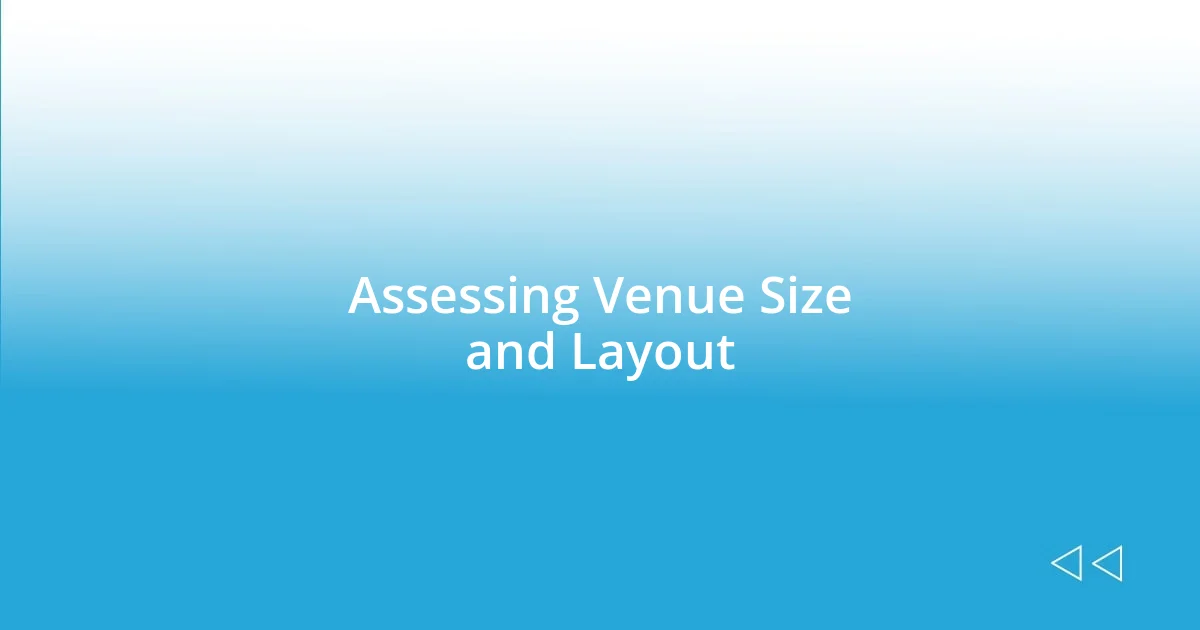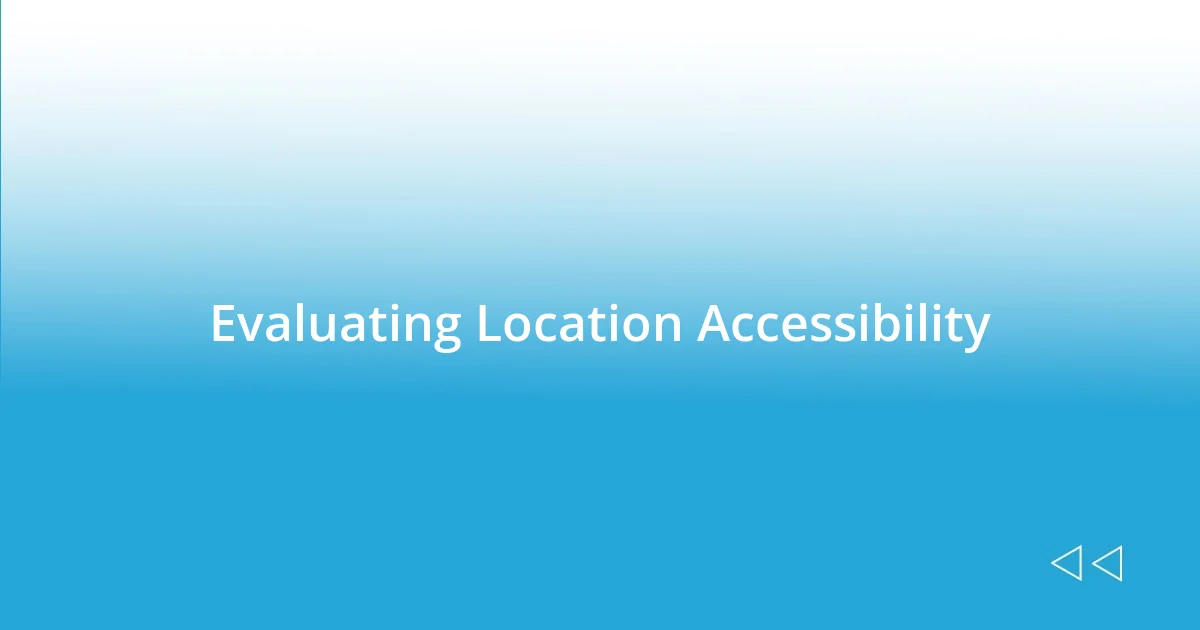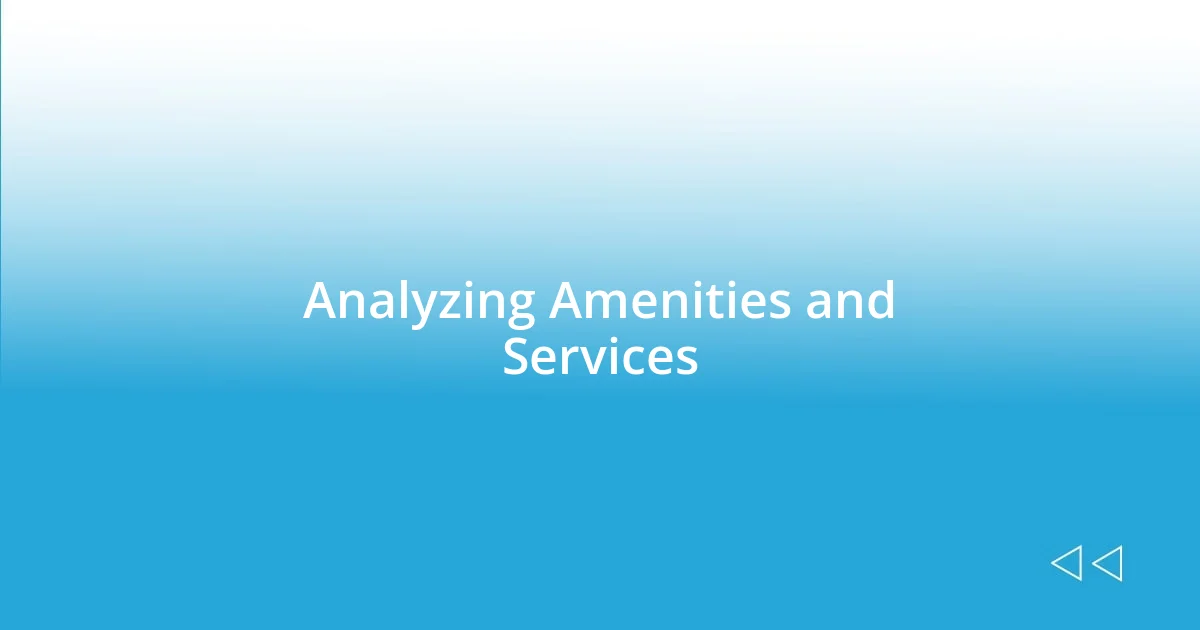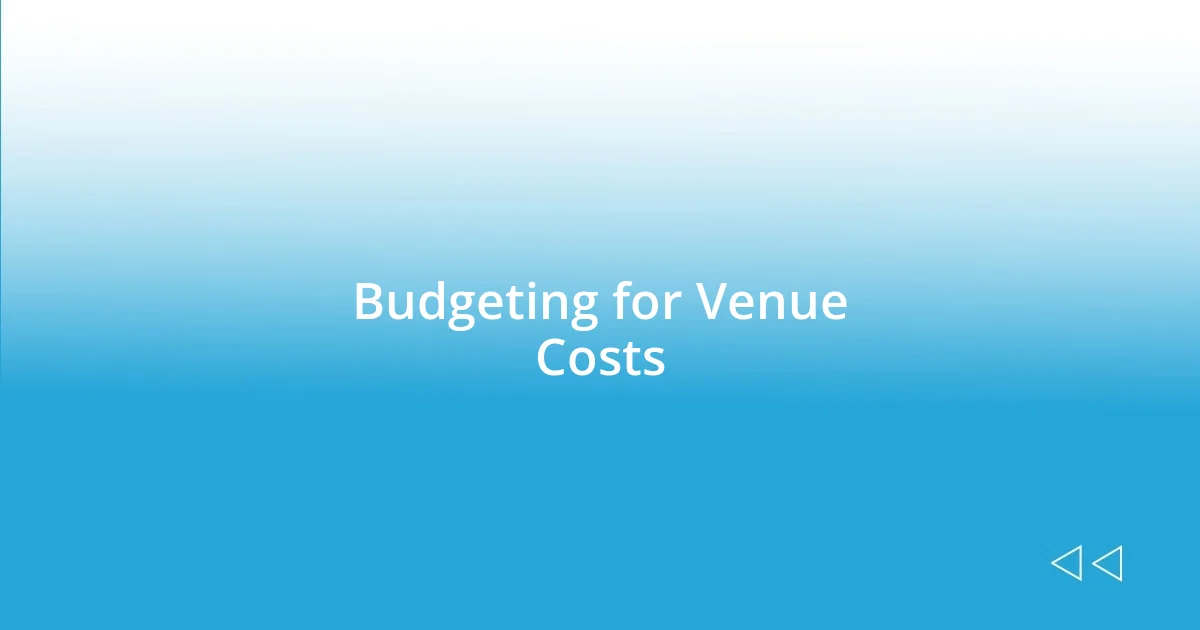Key takeaways:
- The atmosphere and accessibility of a venue are critical to enhancing the overall event experience for attendees.
- Proper assessment of venue size, layout, and amenities is essential to align the venue with the event’s unique requirements and goals.
- Reviewing customer feedback and understanding pricing flexibility can greatly influence the selection of a venue, ensuring it meets expectations and budget constraints.

Key Considerations for Selecting Venues
When choosing a venue, the atmosphere is paramount. I once attended an event where the space was as dazzling as the program, which made a lasting impression on me. It got me thinking: how often do we overlook the energy of the place?
Another key factor is accessibility. I remember a time when I had to navigate an obscure location, and the frustration just overshadowed the excitement of the event. It made me realize that a great venue must be easy to reach for everyone. After all, if your guests can’t comfortably get there, what’s the point in hosting an unforgettable gathering?
Lastly, consider the amenities offered. I once found myself at a venue completely lacking in essential tech support, and it was quite the scramble! Reflecting on that experience, I’ve learned that a venue should provide not just stunning aesthetics but also the practical features that align with your event’s needs. What’s your experience in this area? Venues that fail in these aspects may present a beautiful façade but ultimately reflect poorly on your event.

Understanding Your Event Needs
Understanding exactly what your event requires is essential to selecting the right venue. I’ve found that identifying the purpose of the event helps me clarify what I truly need. For instance, I once organized a team-building workshop that transformed into a creative brainstorming session. The original venue didn’t allow for breakout discussions, which dimmed the collaborative spirit I was aiming for. So, defining whether your event is formal, casual, or somewhere in between can be a game-changer.
Here are some specific needs to consider when choosing your venue:
- Capacity: Will it comfortably fit your guests?
- Layout: Does the space support the event’s activities, like presentations or mingling?
- Ambiance: Does it match the tone you want to set, whether it’s celebratory or professional?
- Technology: Are necessary tools like Wi-Fi, projectors, and sound systems readily available?
- Catering options: Can the venue accommodate dietary restrictions and offer diverse menu choices?
Each of these factors plays a significant role in ensuring your event is not only attended but also memorable. Reflecting on my past experiences, I can’t emphasize enough how vital it is to align your venue’s strengths with your event’s unique goals.

Assessing Venue Size and Layout
When it comes to venue size and layout, I’ve learned firsthand how crucial these factors are for the overall experience. I once hosted a networking event in a hall that was far too spacious for our small group. The expansive room created an atmosphere that felt both empty and awkward, rather than inviting and intimate. It struck me that a well-sized venue promotes interaction, making it easier for guests to connect and engage with one another. How does space affect your gatherings?
The layout of a venue can define the event’s flow. I remember attending a gala where the seating was arranged in a way that made it nearly impossible to mingle. Guests sat rigidly at their tables, limiting the potential for conversation and networking. By contrast, a well-structured layout with open spaces and easily accessible areas for conversation can elevate the entire event. I always advocate for a venue that allows for flow—not just in physical movement, but in the connections that form throughout the event.
When assessing venue size and layout, it’s essential to visualize how your activities will unfold. For instance, if you’re planning a workshop with breakout sessions, you’ll want to ensure that the venue allows for smaller, intimate areas. In one of my projects, we found a versatile space that could adapt to our needs, and it truly transformed the engagement levels of participants. Being able to pivot between styles of interaction can make a profound difference in your event’s success.
| Venue Size | Layout Considerations |
|---|---|
| Too Large | Open spaces that hinder interaction |
| Just Right | Inviting space that encourages guest engagement |
| Too Small | Cramped space leading to discomfort |
| Flexible Layout | Adaptable direction for various activities, such as mingling or presentations |

Evaluating Location Accessibility
When evaluating location accessibility, I can’t stress enough how vital transportation options are. One experience that stands out for me was organizing a seminar in a venue located miles from public transit. I noticed many participants were frustrated and late, which created a ripple effect that disrupted the entire agenda. A venue should ideally be easily reachable by car or public transportation, making it convenient for your guests to attend without a hitch. Have you considered how transportation could impact your attendees’ experience?
Parking availability is another critical aspect. I recall a celebration I attended where the venue had limited parking, causing guests to scavenge for spaces blocks away. This not only inconvenienced them but also decreased the overall enjoyment of the event. I always look for venues that offer ample parking or even partnerships with nearby facilities. It’s a small detail, but when guests don’t have to worry about where to park, they can focus on enjoying the occasion.
Finally, I find that the surrounding area matters just as much as the venue itself. Imagine hosting an event where guests are excited to explore nearby attractions when they arrive. I once selected a venue near charming cafes and shops, which sparked conversations among attendees eager to visit afterward. Ensuring your venue is in a vibrant location can enhance the overall experience. Is your chosen venue in an area that encourages exploration and engagement?

Analyzing Amenities and Services
Analyzing amenities and services is a pivotal part of selecting the right venue for any event. I remember a corporate retreat I organized that was hosted in a venue boasting impressive AV equipment. The moment we began, everything just clicked—good sound, great visuals, and seamless transitions between speakers. I’ve come to value venues that understand the importance of high-quality technology. How often have you dealt with technical glitches that could have been avoided?
Beyond tech, the catering services can make or break the experience. I once attended an outdoor wedding where the food was exceptional—locally sourced and beautifully presented. The caterers even created a customizable menu, allowing guests to choose dishes that catered to their preferences and dietary needs. Whenever I plan an event, I ensure that the catering team has flexibility and creativity. After all, what’s an event without delicious sustenance to fuel the conversations and connections?
Lastly, the customer service of the venue can greatly influence the event’s success. During one gathering, I was blown away by how attentive the staff was, responding promptly to our needs and even offering recommendations based on their local expertise. This experience reinforced for me that supportive and knowledgeable staff can help navigate unexpected challenges smoothly. Have you ever experienced a situation where an attentive team turned a potential disaster into a success? It’s these thoughtful details that truly elevate the atmosphere and ensure guests leave with fond memories.

Budgeting for Venue Costs
Budgeting for venue costs often requires a delicate balancing act. When I coordinated a charity gala, I learned firsthand how quickly expenses can add up. The venue rental fee was just the tip of the iceberg; additional costs like insurance, security, and even décor crept in. I’ve found that breaking down the budget into categories helps keep everything in check. Have you ever been caught off guard by hidden costs?
Something that proved invaluable in my planning was understanding the importance of flexibility in pricing. I once secured a venue that offered discounts for off-peak times, which allowed us to allocate more funds for entertainment. This experience taught me that timing can dramatically affect your budget and guest experience. It’s worth asking venues about their pricing structures to uncover potential savings. Is there a specific date or time that could enhance your budget?
Another lesson I’ve learned is not being afraid to negotiate. During one event, I discovered that discussing my plans with the venue manager opened doors to special deals and added services. I’ve often found that building rapport can lead to unexpected perks, whether it’s complimentary setup or discounted packages. Have you negotiated with a venue before? It’s worth considering how a little conversation can yield substantial benefits for your budget.

Reviewing Customer Experiences and Feedback
Reviewing customer experiences and feedback is essential for determining if a venue truly meets expectations. I’ll never forget hosting a milestone birthday party for a friend. We sifted through online reviews and testimonials, and I was surprised how often guests mentioned the warmth of the staff. It made me realize that an attentive team can turn any space into a welcoming haven. Have you ever chosen a place based on the heartfelt stories of others?
Another key aspect I’ve found is the power of social media feedback. While planning a recent workshop, I checked Instagram and Facebook comments about various venues. It struck me how genuine comments could reveal things that formal reviews might miss, like the little extra touches that make an event special. Have you found a venue that just felt right because of what others shared online?
Lastly, I always consider how venues respond to feedback. When a facility takes the time to address concerns or compliments, it shows they value their clients’ experiences. During a conference at one such venue, I noticed they implemented changes based on past feedback, which enhanced the overall atmosphere. Isn’t it refreshing to see a venue actively engaging with its clientele? This level of commitment can really influence my decision in selecting a great venue.
















